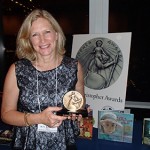In May 2013, Jo Kittinger traveled to New York City to receive a Christopher Award for The House on Dirty Third Street, a book that “affirms the highest values of the human spirit” in the words of the selection committee.
The seed for The House on Dirty Third Street was planted when Kittinger and her husband were out of town, searching for an address on Thirty-Third Street. Kittinger became tongue-tied and she said dirty-third for thirty-third. “I started wondering what Dirty-Third Street would look like,” she says. One wisp of an idea led to another and soon Kittinger incorporated her experience repairing homes with fellow church-members in impoverished neighborhoods with her family’s frequent moves during her childhood. “The House on Dirty-Third Streetcaptured a lot of who I am,” she says, “those memories of moving and having to start over in a new place.”
In the opening pages of the book, the main character surveys her new run-down, overgrown home with dismay. Her mother replies, “Try looking at it through eyes of faith.” Originally, Kittinger’s editor wanted to delete the line, but Kittinger held her ground because faith drives her “to help make the world a little better” and she knew that readers of all religions (or even no religious faith) would connect with the sentiment.
Kittinger earned a Bachelor’s degree in Fine Arts with an emphasis on pottery. Before her children were born she worked in a studio and owned a gallery. “I was always creative and I always loved books, but I didn’t put them together until my kids were in school.” One of the elementary school parents offered a class on writing and Kittinger signed up.
Early in her professional career, Kittinger and members of her critique group helped found the local chapter of the Society of Children’s Book Writers and Illustrators (www.scbwi.org). The professional exchange of ideas, dedication to craft, and guest speakers made Kittinger a better writer. “I would have quit long before I got published if not for SCBWI,” she says.
Nature inspires much of Kittinger’s nonfiction work. “I was ten years old when I fell in love with being outside,” she says. Her books about birds and plants speak to her fascination with the natural world, but she has been known to piggy-back off her rockhound husband’s obsession with geology. One time Kittinger called a potential editor to find out the status of her book proposal about hot air ballooning. Instead of the editor, she says, “the top dog publisher answered.” He said that he had already signed up another book on hot air ballooning, but asked for other ideas. On the spot and fumbling for inspiration, Kittinger looked around her home and noticed rocks on every surface. A Look at Rocks: From Coal to Kimberlite was born and was voted a Best Science Book for Children.
Kittinger confesses that while she has an interest in rocks, it does not compare to her husband’s passion. That said, she wrote Stories in Stone, in part, because of the many cool fossils they have uncovered on trips together. A sharktooth. Whale vertebrae. Mosasaur poop—a marine reptile from the late Cretaceous period.
A friend introduced Kittinger to an attorney conducting a research project on legal literacy for children. Always open to “opportunities outside the box,” Kittinger says they discussed a story in which an asthmatic child’s condition is exacerbated by the mold in her apartment. The immigrant family avoids discussing the problem with the landlord for fear they will be evicted, but finds assistance from a Medical Legal Partner at the hospital who helps negotiate the needed repairs. Published by the American Bar Association, A Breath of Hope and the newly released Helping a Hero are the first two titles in this new series for children.
The soft-spoken Kittinger writes from her home in Birmingham, Alabama. “I wish I had a daily writing schedule,” she says. “I don’t have set hours, although I’m always thinking about my writing whether or not I’m sitting at my desk.” In addition to picture books, Kittinger is hard at work on an as-yet unfinished young adult novel. “The emotions in the novel scare me,” she says. The book dredges up feelings and memories from her severely handicapped son’s death in 2000. “He taught us the meaning of unconditional love,” she says. “I am afraid of the emotions I’m going to experience in writing it and I’m afraid that I can’t do it well enough. Maybe I haven’t finished [the manuscript] because I’m afraid.”
According to Kittinger, her former critique partner and National Book Award winner Han Nolan, “once told me that ‘writing should make us afraid–to go as deep as we go, being vulnerable, and getting to the depth of emotion.’ That was encouragement for me. I tend to be guarded.”
A self-described extrovert-introvert, Kittinger enjoys meeting new people and hearing their stories, yet craves solitude to recharge. “I’m energized by time alone,” she says. Creating new pottery is one of the many ways she refuels herself. “About once a year, I’ll get muddy,” she says.


